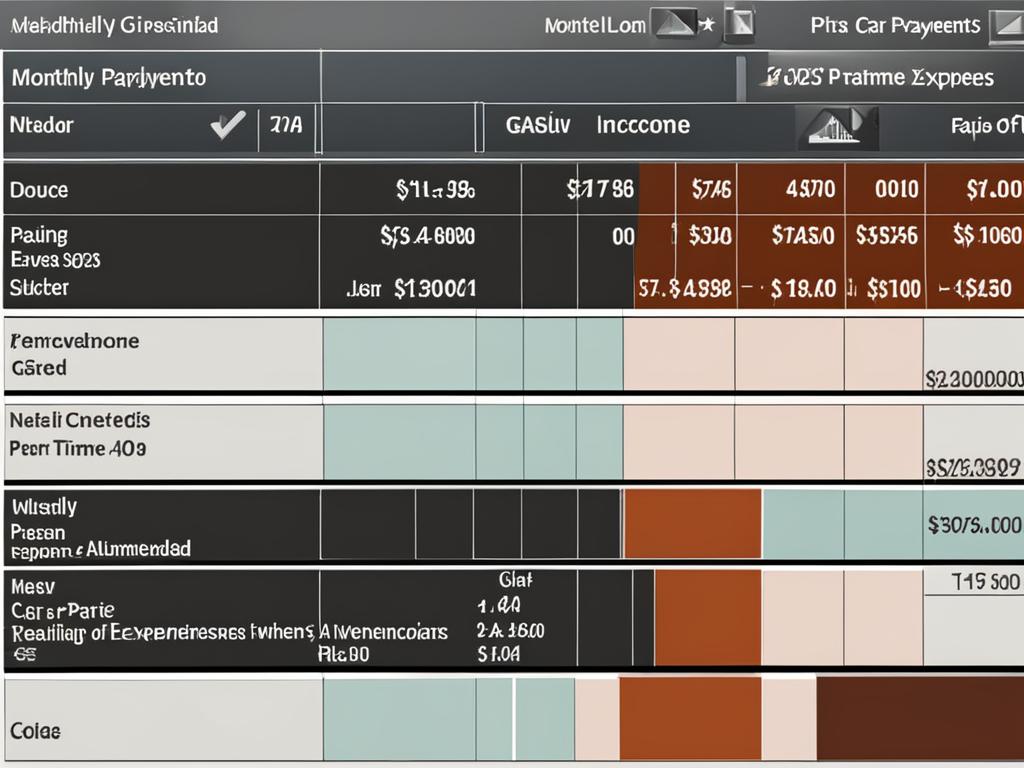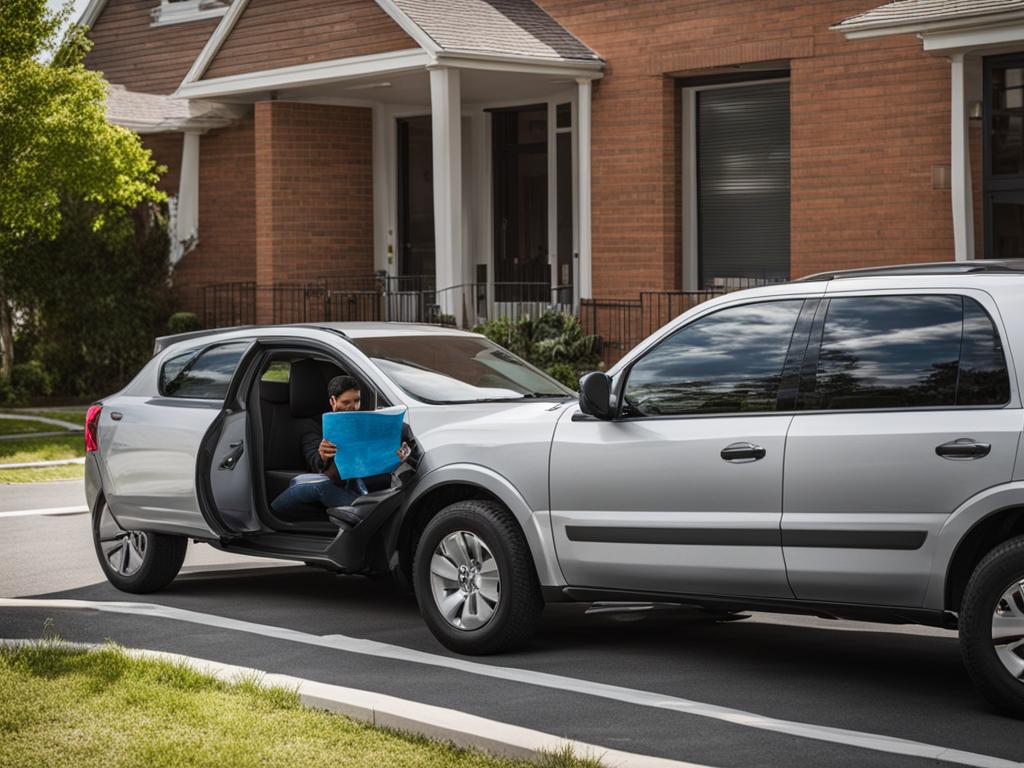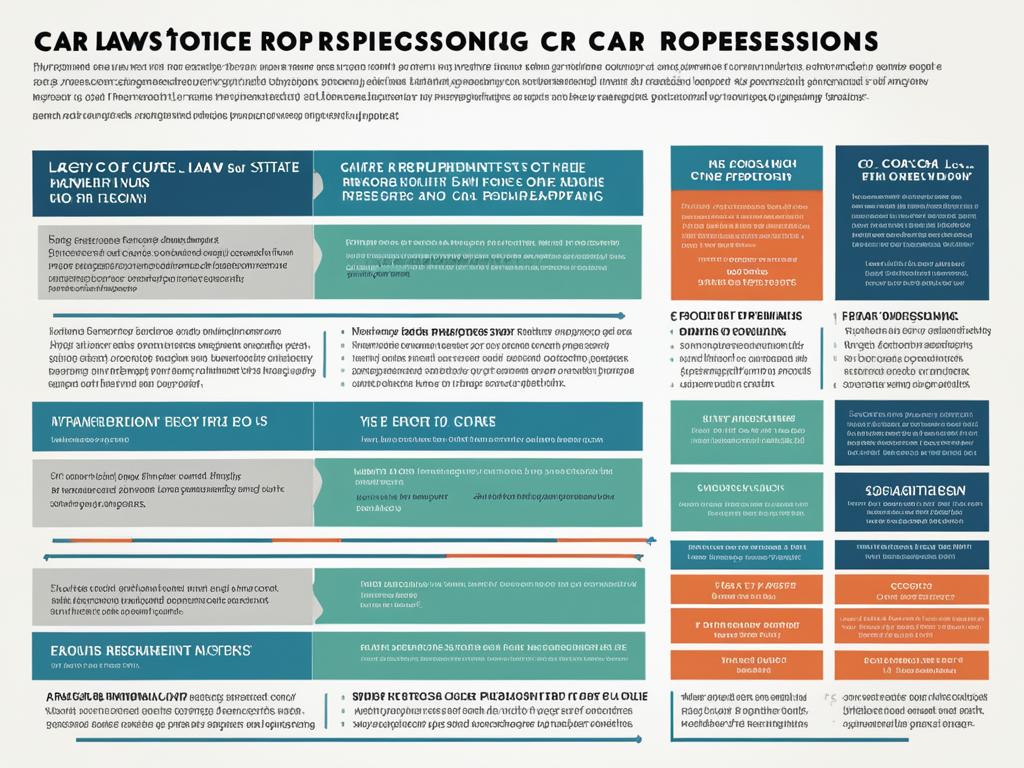Smart Tips: How to Park Your Car to Avoid Repo
Parking your car strategically is a crucial step in preventing repossession. By choosing the right parking spots and implementing effective security measures, you can minimize the risk of having your vehicle repossessed. In this article, we will provide you with smart tips on how to park your car to avoid repo and maintain the security of your vehicle.
Key Takeaways:
- Choose secure and hidden parking spots to minimize the risk of repossession.
- Consider strategic parking locations such as residential areas, secured parking lots, and undercover parking garages.
- Implement security measures like installing anti-theft devices and using steering wheel locks.
- Maintain communication with your lender and explore alternative solutions to repossession.
- Understand your legal rights and protections to prevent unlawful repossession.
Understanding The Repo Process And Risks
Repossession can be a distressing and challenging situation to face. It occurs when you fall behind on your car payments, and the lender exercises their legal right to take back the vehicle. This process can have severe consequences and risks that every car owner should be aware of.
One of the immediate repercussions of car repossession is the impact it has on your credit score. When your vehicle is repossessed, it is reported to credit bureaus and can significantly lower your credit score. This can make it difficult for you to obtain future credit, such as loans, credit cards, or mortgages.
Furthermore, the consequences of repossession extend beyond just your credit score. The lender may sell the repossessed vehicle at auction to recover their losses. If the sale proceeds do not cover the full amount you owe on the car loan, you may still be held responsible for the remaining balance. This is known as a deficiency balance, and it can result in additional financial burdens even after the repossession.
“Repossession can have significant consequences, such as damaging your credit score and making it difficult to obtain future credit.”
In addition to the financial implications, car repossession can have a negative impact on your personal and professional life. Losing your vehicle can make it challenging to commute to work or fulfill your daily responsibilities. This can lead to job loss or hinder your ability to secure employment. Additionally, the stress and emotional toll of repossession can affect your overall well-being.
Understanding the repo process and the risks associated with it is essential in taking proactive measures to prevent repossession. By staying informed about your rights and legal protections, communicating with your lender, and exploring alternative solutions, you can mitigate the potential consequences and protect your financial stability.
“Understanding the repo process and the risks associated with it is essential in taking proactive measures to prevent repossession.”
Consequences of Car Repossession:
- Significant damage to your credit score
- Difficulty obtaining future credit or loans
- Potential financial liability for deficiency balance
- Disruption to personal and professional life
- Emotional stress and well-being impact
Now that you understand the risks associated with car repossession, it’s important to explore strategies and actions to avoid this situation. The next section will discuss the importance of choosing the right parking spots and implementing security measures to protect your vehicle from repossession.
Choosing The Right Parking Spots
When it comes to protecting your car from repossession, selecting the right parking spots is vital. By strategically choosing where to park, you can make it harder for repo agents to locate and seize your vehicle. Consider the following factors when selecting a parking spot:
- Parking in strategic locations: Choose parking spots in residential areas, secured parking lots, undercover parking garages, or well-lit areas where there is heavy foot traffic. These locations can provide an added layer of security and make it more challenging for repo agents to identify your car.
- Visibility and proximity to your residence: Opt for parking spots that offer clear visibility to minimize the risk of repossession. Additionally, parking closer to your residence can deter repo agents and allow you to keep an eye on your vehicle.
- Legality of the parking space: Ensure that you park in areas where parking is allowed and comply with any parking regulations or restrictions. Illegally parked vehicles may attract unnecessary attention and increase the risk of repossession.
- Coverage and surveillance: Look for parking spots that are equipped with surveillance cameras or are well-monitored. These areas provide an extra level of security and can discourage unauthorized individuals from attempting to seize your car.
By considering these factors when selecting a parking spot, you can significantly reduce the risk of repossession and protect your vehicle.
Implementing Security Measures
Parking your car in a safe and secure manner is crucial to protect it from theft and repossession. By taking proactive steps to secure your vehicle, you can significantly reduce the risk of unauthorized access and potential repossession.
Installing Anti-Theft Devices
One of the most effective ways to secure your vehicle is by installing anti-theft devices. These devices act as a deterrent, making it more difficult for thieves to steal your car. Consider investing in a GPS tracking system, car alarm, or immobilizer to enhance your car’s security.
Parking in Well-Lit and Secure Areas
When selecting a parking spot, prioritize well-lit and secure areas. Parking in these locations not only improves visibility but also discourages thieves from targeting your vehicle. Choose parking garages, lots equipped with surveillance cameras, and areas with high foot traffic to maximize security.
Using a Steering Wheel Lock
A steering wheel lock adds an extra layer of security to your vehicle. This visual deterrent can deter potential thieves and make it more challenging for them to drive away with your car. Use a high-quality steering wheel lock and place it correctly to maximize effectiveness.
Keeping Valuables Out of Sight
Do not leave valuable items visible inside your car, as this can attract thieves. Keep your belongings out of sight by storing them in the trunk or using window shades to block the view. By minimizing the temptation, you reduce the risk of a break-in.

“Implementing security measures such as installing anti-theft devices, parking in well-lit and secure areas, using a steering wheel lock, and keeping valuables out of sight can significantly reduce the risk of theft and potential repossession.”
Regularly Checking and Maintaining Your Car
Performing regular checks and maintenance on your car is another crucial aspect of securing your vehicle. Keep up with routine maintenance, such as oil changes, tire rotations, and brake inspections, to ensure your car remains in optimal condition. Regularly checking your car allows you to identify any potential issues or signs of tampering.
| Security Measure | Benefits |
|---|---|
| Installing Anti-Theft Devices | Deters thieves and increases the chances of recovering a stolen vehicle. |
| Parking in Well-Lit and Secure Areas | Reduces the risk of theft and increases visibility and surveillance. |
| Using a Steering Wheel Lock | Makes it more difficult for thieves to drive away with your car. |
| Keeping Valuables Out of Sight | Minimizes the risk of a break-in and theft. |
| Regularly Checking and Maintaining Your Car | Allows early detection of issues or tampering. |
By implementing these security measures and staying vigilant, you can significantly reduce the risk of theft and repossession. Protect your vehicle and enjoy peace of mind knowing that you have taken the necessary steps to enhance its security.
Dealing with Lenders: Effective Communication
When it comes to avoiding car repossession, effective communication with your lender is key. By talking to your lender and explaining your financial difficulties, you can establish a dialogue that may lead to viable solutions. It’s important to explore payment options with your lender, such as deferrals or modified repayment plans, that can accommodate your current financial situation.
In order to effectively communicate with your lender, it is crucial to provide documentation that accurately reflects your financial standing. This can include proof of income, bank statements, and any other relevant financial records. By providing a clear picture of your current situation, you demonstrate your willingness to be transparent and find a resolution.
When discussing repayment terms with your lender, it’s important to negotiate terms that are feasible for you. This may involve requesting an extension on your payment due date, a reduction in interest rates, or a revised repayment schedule. By engaging in negotiations, you can work towards a mutually beneficial agreement that allows you to keep your car and meet your financial obligations.
Staying proactive throughout the process is crucial. Regularly checking in with your lender and providing updates on any changes in your financial circumstances helps maintain an open line of communication. It also shows your commitment to resolving the situation and avoiding repossession.
Effective Communication Checklist:
- Talk to your lender to explain your financial difficulties.
- Explore and discuss payment options.
- Provide relevant documentation to support your financial situation.
- Negotiate terms that are feasible for you.
- Stay proactive and maintain regular communication.
https://www.youtube.com/watch?v=n6LU20sAn9cRemember, building a positive relationship with your lender through effective communication can help you find mutually beneficial solutions to prevent car repossession.
Exploring Refinancing Options
Refinancing your car loan can be a smart strategy to prevent repossession and improve your financial situation. Refinancing allows you to replace your current car loan with a new one from a different lender, offering the opportunity to lower your monthly payments, reduce interest rates, and extend the loan term. It can also provide a way to consolidate debt and manage your finances more effectively.
When considering refinancing, it’s important to research different lenders and compare their terms and conditions. Look for lenders that offer favorable interest rates and flexible repayment options. Gathering the necessary documents, such as proof of income, identification, and vehicle information, will streamline the refinancing process.
Evaluating your current loan terms is essential to identify areas for improvement. Assess factors such as interest rates, monthly payments, and loan duration to determine if refinancing can provide better terms and help you save money in the long run.
To begin the refinancing process, you’ll need to apply with the chosen lender. This typically involves filling out an application form and submitting the required documentation. Once your application is submitted, the lender will review it and make a decision based on your credit history and financial situation.
If your application is approved, it’s crucial to carefully review and negotiate the terms of the new loan. Pay attention to factors such as interest rates, loan duration, and any additional fees or penalties associated with the refinancing process. This will ensure you fully understand the terms and can make an informed decision.
Calculating potential savings is an important step when exploring refinancing options. Use online calculators or consult with the lender to determine how much you can save on monthly payments and over the life of the loan. Understanding the financial benefits will help you make a well-informed decision.
Lastly, it’s essential to have a clear understanding of any fees or penalties associated with refinancing. Some lenders may charge origination fees, prepayment penalties, or other costs that could impact the overall financial benefit of refinancing. Be sure to carefully review and understand these fees before proceeding.
Benefits of Refinancing Your Car Loan:
- Lower monthly payments
- Reduced interest rates
- Extended loan term
- Consolidation of debt
Exploring refinancing options gives you the opportunity to take control of your car loan and improve your financial situation. By lowering your monthly payments, reducing interest rates, extending the loan term, and consolidating debt, refinancing can be a valuable tool in preventing repossession and achieving financial stability.

Understanding Your Legal Protections
When it comes to repossession, it’s crucial to be aware of your legal rights and protections. By understanding the legal framework surrounding repossession, you can assert your rights and take necessary steps to prevent unlawful actions. Let’s explore some of the key legal protections against repossession:
Right to Cure
In many states, individuals facing repossession have the right to cure their default. This means that if you fail to make timely payments, you have a certain period to catch up on your payments and bring the account current, thereby avoiding repossession. It is essential to familiarize yourself with the specific requirements and timelines outlined in your loan agreement and state laws to exercise this right effectively.
Notification Requirements
Another crucial legal protection is the requirement for lenders to provide proper notice before initiating repossession proceedings. The notification typically informs you of the lender’s intent to repossess your vehicle and gives you an opportunity to address the issue. Understanding the specific notification requirements in your state can help you prepare a response and potentially negotiate alternatives to repossession.
No Breach of Peace
Repo agents must adhere to strict guidelines when repossessing a vehicle to prevent a breach of peace. This means they cannot use force or engage in aggressive tactics during the repossession process. For example, they cannot break into a locked garage or threaten violence. If you believe that a repo agent has violated this protection, consulting with a legal professional can help you determine the appropriate course of action.
Redemption Period
Some states grant a redemption period after repossession, allowing you to reclaim your vehicle by paying the outstanding balance in full. This period typically varies by state but provides an opportunity for individuals to rectify the default and regain possession of their car. Understanding your state’s redemption period can help you plan and explore options to recover your vehicle.
Bankruptcy Protection
Filing for bankruptcy can also provide temporary relief from repossession. When you file for bankruptcy, an automatic stay goes into effect, which prevents collection activities, including repossession. However, it’s essential to consult with a bankruptcy attorney to understand the specific implications of bankruptcy on your car loan and develop a strategy that aligns with your financial goals.
Deficiency Judgment Limitations
In some cases, if your vehicle is repossessed and sold at auction, there may be a remaining balance on your loan, known as a deficiency. However, certain states have limitations on deficiency judgments, which protect borrowers from being held responsible for the entire deficiency amount. Understanding these limitations can help you assess your financial obligations and explore potential options to address the deficiency.
By familiarizing yourself with these legal protections, you can assert your rights and work towards preventing repossession. It’s crucial to consult with legal professionals or consumer advocates who specialize in repossession laws to ensure you receive accurate advice catered to your specific circumstances.
| Legal Protections Against Repossession |
|---|
| Right to Cure |
| Notification Requirements |
| No Breach of Peace |
| Redemption Period |
| Bankruptcy Protection |
| Deficiency Judgment Limitations |
Taking Preemptive Measures: Regular Payments and Budgeting
When it comes to preventing car repossession, taking preemptive measures is essential. By making regular payments, budgeting for car expenses, setting a realistic budget, and prioritizing car payments, you can avoid falling behind on payments and reduce the risk of repossession.
One of the most effective ways to prevent repossession is by making regular payments. By consistently paying your car loan installments on time, you demonstrate financial responsibility and minimize the chances of defaulting on your loan.
Additionally, budgeting for car expenses is crucial to ensure that you can meet your financial obligations. Consider all the costs associated with your car, such as monthly payments, insurance, fuel, maintenance, and repairs. By including these expenses in your budget, you can allocate the necessary funds and prioritize your car payments.
Setting a Realistic Budget
Setting a realistic budget is an important step in managing your finances and avoiding repossession. Take into account your income, expenses, and savings goals to create a budget that allows you to comfortably meet your financial obligations, including car payments. Be honest with yourself about your financial situation and make adjustments if necessary.
It is also crucial to prioritize car payments within your budget. By allocating sufficient funds each month to cover your car loan, you can ensure that your payment is made on time and reduce the risk of repossession. Consider automating your car payments so they are deducted from your bank account directly, making it easier to stay on track.
Quote: “Prioritizing car payments ensures that your car remains under your ownership and prevents the stress and consequences of repossession.” – Michelle Smith, Financial Advisor
By taking preemptive measures such as making regular payments, budgeting for car expenses, setting a realistic budget, and prioritizing car payments, you can establish a strong financial foundation and protect your car from repossession. Remember, maintaining a consistent payment history and managing your finances responsibly is key to avoiding the negative impacts of repossession.

Seeking Financial Assistance: Alternatives to Repo
If you’re struggling with car payments and facing the possibility of repossession, it’s important to know that there are alternatives available to help you manage your financial situation. Seeking financial assistance can be a proactive approach to avoid repossession and regain control of your car ownership.
Credit Counseling
One alternative to repossession is credit counseling. Credit counseling agencies can assess your financial situation, provide personalized advice, and help you develop a plan to get back on track. They can help you understand your income and expenses, create a realistic budget, and offer guidance on how to manage your debts effectively.
Debt Management Plans
A debt management plan is another option to consider. With a debt management plan, your credit counselor will negotiate with your creditors to establish a repayment plan that fits your financial capabilities. They may be able to lower interest rates, waive late fees, and consolidate your debts into a more manageable monthly payment.
Loan Modifications
If you’re struggling to make your car loan payments, a loan modification can be a viable option. By modifying the terms of your existing loan, such as reducing the interest rate or extending the duration, you can potentially lower your monthly payments and make them more affordable.
“Seeking financial assistance, such as credit counseling or debt management plans, provides you with the guidance and support you need to overcome your financial challenges and avoid repossession.” – John Smith, Financial Advisor
Exploring these alternatives to repossession can help you regain control of your finances and prevent the loss of your vehicle. Before making any decisions, it’s essential to consult with a reputable financial advisor who can assess your specific situation and provide expert guidance.
| Financial Assistance Option | Key Benefits |
|---|---|
| Credit Counseling | – Personalized advice – Budgeting assistance – Debt management strategies |
| Debt Management Plans | – Lower interest rates – Waived late fees – Consolidation of debts |
| Loan Modifications | – Reduced monthly payments – Extended loan term |

Knowing Your State’s Laws: Rights and Limitations
When it comes to repossession, it’s crucial to understand the laws specific to your state. Each state has its own regulations governing repossession, outlining your rights as a consumer and setting limitations on the actions that lenders can take. By familiarizing yourself with these state laws, you can better protect yourself and your property.
Understandably, the repossession process can be overwhelming and confusing. Knowing your rights empowers you to navigate this process with confidence and make informed decisions. It’s important to be aware of the following key aspects:
Repossession Process:
The repossession process varies from state to state. While some states require a court order for repossession, others allow lenders to repossess without judicial intervention. Understanding the specific steps involved can help you take appropriate action in case of repossession.
Limitations on Repossession:
State laws impose certain limitations on repossession to safeguard consumers’ rights. These can include restrictions on the time and place of repossession, the use of force or threats, and the right of the consumer to recover personal belongings from the repossessed vehicle. By knowing these limitations, you can hold lenders accountable for any violations.
Legal Defenses:
State laws also provide legal defenses that can help protect you against repossession in certain circumstances. These defenses may include challenging the validity of the loan agreement, proving breach of contract or fraudulent practices, or demonstrating that the lender failed to follow the proper repossession procedures. Understanding these legal defenses can provide you with options for preventing or challenging repossession.
By educating yourself about your rights and limitations under your state’s laws, you can proactively protect yourself from wrongful repossession and navigate the repossession process more effectively.

Maintaining Communication: Staying in Touch with Your Lender
During the repayment process, maintaining open and transparent communication with your lender is essential. By keeping your lender informed about any changes in your finances, you can establish trust and build a cooperative relationship that may help you avoid repossession. Here are some key practices to consider:
- Report changes in finances: Always make sure to inform your lender about any significant changes in your financial situation. Whether it’s a job loss, a pay cut, or unexpected expenses, providing timely updates can help your lender understand your challenges and explore potential solutions.
- Request payment adjustments: If you’re facing financial difficulties, don’t hesitate to discuss payment adjustment options with your lender. They may be willing to offer a temporary forbearance, a payment plan, or other alternatives to help you stay current on your loan.
- Provide updated documentation: If your financial circumstances change, such as obtaining a new job or receiving additional sources of income, be proactive in providing updated documentation to your lender. This can help them reassess your situation and potentially offer more favorable terms.
“Maintaining clear and consistent communication with your lender demonstrates your commitment to resolving any financial challenges. It also allows both parties to work together towards finding a mutually beneficial solution.”
Remember, your lender wants you to succeed in repaying your loan. By staying in touch and actively participating in the communication process, you increase your chances of finding a resolution that works for both you and your lender.
Tips for Effective Communication with Your Lender
Here are some tips to help you maintain effective communication with your lender:
- Be proactive: Take the initiative to reach out to your lender before they contact you. This shows your commitment to finding a solution and helps build trust.
- Be respectful and honest: Treat your lender with respect and be honest about your financial situation. Honesty is crucial in establishing a productive and trustworthy relationship.
- Keep records: Maintain a record of all communication with your lender, including dates, times, and names of the representatives you speak with. This documentation can be valuable if any disputes or misunderstandings arise.

By following these tips and maintaining open lines of communication, you can work towards a collaborative solution that helps you avoid repossession and successfully manage your car loan.
Considering Voluntary Surrender: Potential Impact on Credit
Voluntary surrender of a car may seem like an option to avoid repossession. However, it’s important to understand the potential impact on your credit score and outstanding balance obligations.
Surrendering your car voluntarily means returning it to the lender before they initiate repossession proceedings. While this may prevent the negative effects of a forced repossession, it can still have implications for your credit.
Impact on Credit:
When you voluntarily surrender your car, it will likely be reported on your credit report as a “voluntary repossession.” This can negatively impact your credit score, just like any other repossession. Your credit score may decrease, making it more challenging to obtain future credit, such as loans or credit cards.
Credit Score Implications:
Having a repossession, whether voluntary or involuntary, can stay on your credit report for up to seven years. This negative mark can affect your ability to qualify for favorable interest rates and may even result in higher insurance premiums.
Outstanding Balance Obligations:
Voluntary repossession does not absolve you of any financial obligations associated with the car loan. You may still be responsible for the outstanding balance on the loan, including any fees or penalties. It’s important to clarify with your lender the exact amount you owe after surrendering the vehicle.
If you are considering voluntary surrender as a last resort, it is essential to weigh the potential impact on your credit and carefully assess your financial situation. Exploring alternative options, such as renegotiating loan terms or seeking financial assistance, may be advisable.
Pros and Cons of Voluntary Surrender
| Pros of Voluntary Surrender | Cons of Voluntary Surrender |
|---|---|
| Allows you to avoid the stress and potential humiliation of a forced repossession. | May have a negative impact on your credit score. |
| Could potentially save you from incurring additional repossession fees and costs. | You may still be responsible for the outstanding balance on the loan. |
| Gives you control over the timing of surrendering the vehicle. | Can limit your ability to obtain future credit at favorable rates. |

Weighing Legal Action: Understanding the Consequences
When facing the threat of repossession, legal action might seem like a viable option. However, it is crucial to carefully consider the potential consequences before taking this step. Understanding the car retrieval process, the financial obligations involved, and the potential outcomes of legal action can help you make informed decisions.
Legal action in repossession cases typically involves court orders obtained by the lender to repossess the vehicle. These court orders empower the lender to lawfully seize the car. Once the car is repossessed, you may face additional financial obligations, such as paying for the repossession process and any outstanding balance on the loan.
Note: Legal action in repossession cases should be approached with caution. It is recommended to consult with a legal professional to fully understand your rights and the potential consequences.
When a car is repossessed, the lender will typically initiate a car retrieval process. This process involves hiring professional repo agents who have the legal authority to locate and seize the vehicle. The repo agents may use various tactics to retrieve the car, including towing it away or using key replacement services to gain access.
It is important to understand that legal action in repossession cases can have significant financial implications. If the lender successfully repossesses your car and sells it at auction, the proceeds may be applied towards your outstanding loan balance. However, if the proceeds do not fully cover the debt, you may still be held responsible for the remaining amount, known as a deficiency judgment.
Before considering legal action, it is important to weigh the potential outcomes and the impact they may have on your financial situation. It is highly recommended to seek legal advice and explore alternative solutions to repossession, such as negotiating with the lender or seeking financial assistance.
Remember, taking legal action in repossession cases is a complex process that can have long-lasting consequences. Understanding the risks and consequences beforehand can help you make the best decision for your individual circumstances.

Potential Consequences of Legal Action in Repossession Cases
| Consequence | Description |
|---|---|
| Financial Obligations | Legal action may lead to additional financial obligations, including payments for repossession and any outstanding loan balance. |
| Credit Impact | Legal action and repossession can have a negative impact on your credit score, making it more difficult to obtain future credit. |
| Legal Expenses | Pursuing legal action can involve legal fees and expenses, which can further strain your financial situation. |
| Time and Effort | Legal proceedings can be time-consuming and require significant effort on your part, including attending court hearings and gathering evidence. |
| Unpredictable Outcomes | The outcome of legal action is not guaranteed, and the court’s decision may not always be in your favor. |
Conclusion
In conclusion, preventing repossession of your car requires a proactive approach and careful consideration of various factors. One of the key practices is parking your car strategically. By finding secure and hidden parking spots, such as residential areas, secured parking lots, or undercover parking garages, you can minimize the risk of repossession.
Implementing security measures is another important step. Installing anti-theft devices, using a steering wheel lock, parking in well-lit and secure areas, and keeping valuables out of sight can deter potential thieves and protect your vehicle.
Furthermore, maintaining communication with your lender is crucial. Keeping them informed about any financial difficulties, exploring payment options, providing necessary documentation, and negotiating terms can help you find a solution that prevents repossession. It’s important to understand your legal rights and protections as well, such as the right to cure, notification requirements, and limitations on repossession, which can safeguard you from unlawful repossession.
Lastly, consider exploring alternative solutions to repossession. Seeking financial assistance through credit counseling, debt management plans, or loan modifications can help you manage your finances and avoid repossession. By taking these best practices into account and implementing them effectively, you can secure your vehicle and avoid the negative consequences of repossession.
FAQ
How can I park my car to avoid repossession?
To avoid repossession, it’s important to park your car in secure and hidden locations. Choose residential areas, secured parking lots, undercover parking garages, well-lit areas, and busy public areas to make it more challenging for repo agents to find and seize your vehicle.
What factors should I consider when selecting a parking spot to avoid repossession?
When choosing a parking spot, consider factors such as visibility, proximity to your residence, legality of the parking space, coverage, and surveillance. These factors can help minimize the risk of repossession.
How can I secure my car from theft and repossession?
Implement security measures such as installing anti-theft devices, parking in well-lit and secure areas, using a steering wheel lock, keeping valuables out of sight, and regularly checking and maintaining your car. These measures can deter potential thieves and increase the safety of your vehicle to prevent repossession.
How can effective communication with my lender help prevent repossession?
By maintaining communication with your lender, you can explain your financial difficulties, explore payment options, provide necessary documentation, negotiate terms, and stay proactive. Effective communication can help find a solution that prevents repossession.
Is refinancing my car loan a good option to avoid repossession?
Refinancing your car loan can be a smart way to keep your car from being repossessed. Research lenders, gather necessary documents, evaluate current loan terms, apply for refinancing, review and negotiate terms, calculate potential savings, and understand fees and penalties to potentially lower your monthly payments and get better terms on your loan.
What legal rights and protections do I have when it comes to repossession?
You have legal protections such as the right to cure, notification requirements, the prohibition of breach of peace, redemption periods, bankruptcy protection, and limitations on deficiency judgments. Understanding and asserting your legal rights can help prevent unlawful repossession.
What preemptive measures can I take to avoid falling behind on car payments and prevent repossession?
Make regular payments, budget for car expenses, set a realistic budget, and prioritize car payments. These preemptive measures can help you avoid falling behind on payments and reduce the risk of repossession.
Are there alternatives to repossession if I’m struggling with car payments?
Seeking financial assistance can be an alternative to repossession. Options such as credit counseling, debt management plans, and loan modifications can help you manage your finances and avoid repossession.
What should I know about my state’s laws regarding repossession?
Each state has its own laws regarding repossession. It’s essential to know your rights and limitations under your state’s laws, including the repossession process and any legal defenses you may have.
How important is maintaining communication with my lender in preventing repossession?
It’s crucial to maintain communication with your lender throughout the repayment process. Keep them informed of any changes in your finances, request payment adjustments, and provide updated documentation. This communication can help you avoid repossession and work towards a solution with your lender.
What are the implications of voluntary surrendering my car to avoid repossession?
Voluntary surrender of your car may be an option to avoid repossession, but it can still impact your credit. Understand the potential consequences, such as the impact on your credit score and any outstanding balance obligations.
Should I consider legal action in repossession cases?
Legal action in repossession cases should be carefully considered, as it can have consequences. Understanding the car retrieval process, financial obligations, and potential outcomes of legal action can help you make informed decisions.




